— The Guardian, April 16, 2025
In 2024, UK mountain rescue teams responded to a record number of incidents—over 1,000 in Scotland alone. A major factor? Hikers relying too heavily on mobile apps and social media recommendations without fully understanding the terrain, weather risks, or how to navigate off-grid.
When your phone dies or the signal disappears, the mountains don’t pause to wait.
At Scot Mountain Holidays, we believe that traditional map-and-compass skills remain essential for safe and confident mountain travel. In fact, we’ve written extensively about this growing issue—see our article on the perils of winter navigation and misreading water features for a detailed look at how small mistakes can lead to big consequences.
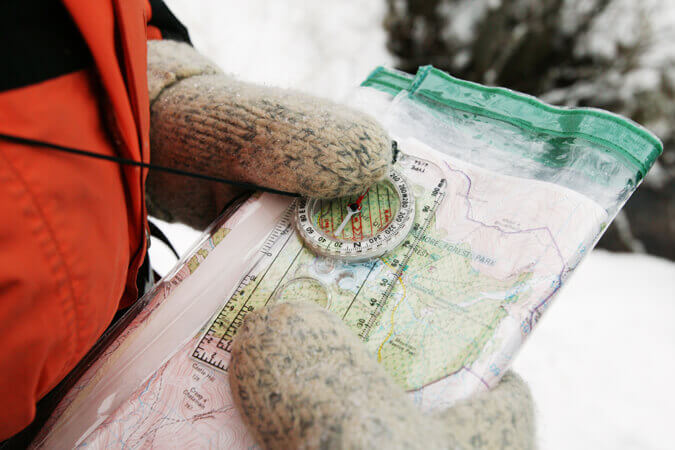
Dachstein mitts don’t necessarily mean that you won’t be able to use a compass or to navigate, as shown by our director Andy Bateman
Proven Expertise
We don’t just run navigation courses—we live and breathe the skills we teach. Our blog on Understanding Navigation breaks down the core concepts behind map reading and route planning, offering a taste of what you’ll learn with us in person.
Real-World Training
Based in the heart of the Cairngorms National Park, our courses take place in some of the UK’s most beautiful—and most navigationally complex—terrain. This isn’t theory in a classroom; this is hands-on, practical instruction in real mountain conditions.
Small Groups, Big Impact
With small group sizes, our instructors can tailor teaching to your pace and experience level. You’ll never feel left behind.
Seasonal Specialisation
Interested in winter hillwalking? Our guide to 30+ top strategies for winter navigation reveals just how much more complex navigation becomes when snow covers key features. We address these scenarios in detail in our winter courses.

Map reading in the Cairngorms
Safety
Learn how to plan routes, interpret contours, avoid hazards like steep ground and water crossings, and make smart decisions in poor visibility.
Confidence
Ditch the dependency on phones. Our aim is to empower you to move through the hills with independence and assurance—even in winter.
Community
You’ll meet fellow outdoor enthusiasts who value skills, resilience, and shared adventure. Many of our guests go on to explore the Highlands together.
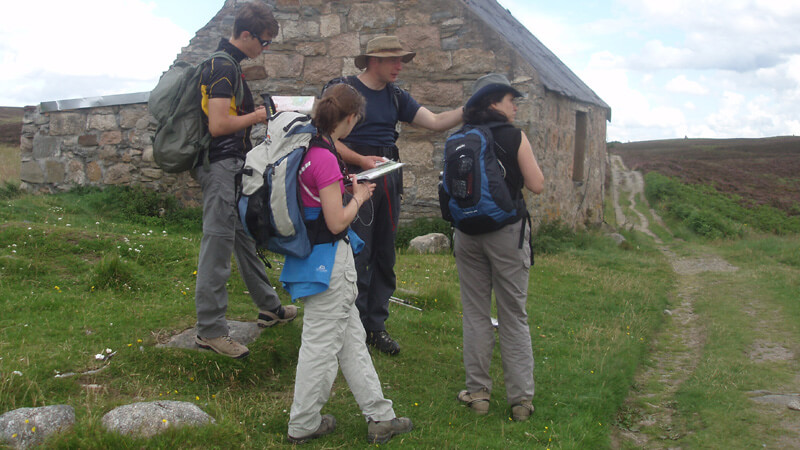
Don’t let poor preparation be the reason you call for help—or cut your adventure short. A traditional navigation course with Scot Mountain Holidays could be the most empowering investment you make in your outdoor journey.
Book your course now
Or get in touch for help choosing the right course for your goals and experience level.
When you walk across the peaks and high tops, spotting a red deer is often a highlight. But behind the beauty lies one of the Highlands’ most complex questions: how do we manage deer populations in a way that protects nature, respects rural traditions, and supports communities?
At Scot Mountain Holidays, we’re deeply connected to the land and its changing story. This includes understanding why deer management—and venison—matter more than ever in the Cairngorms National Park.
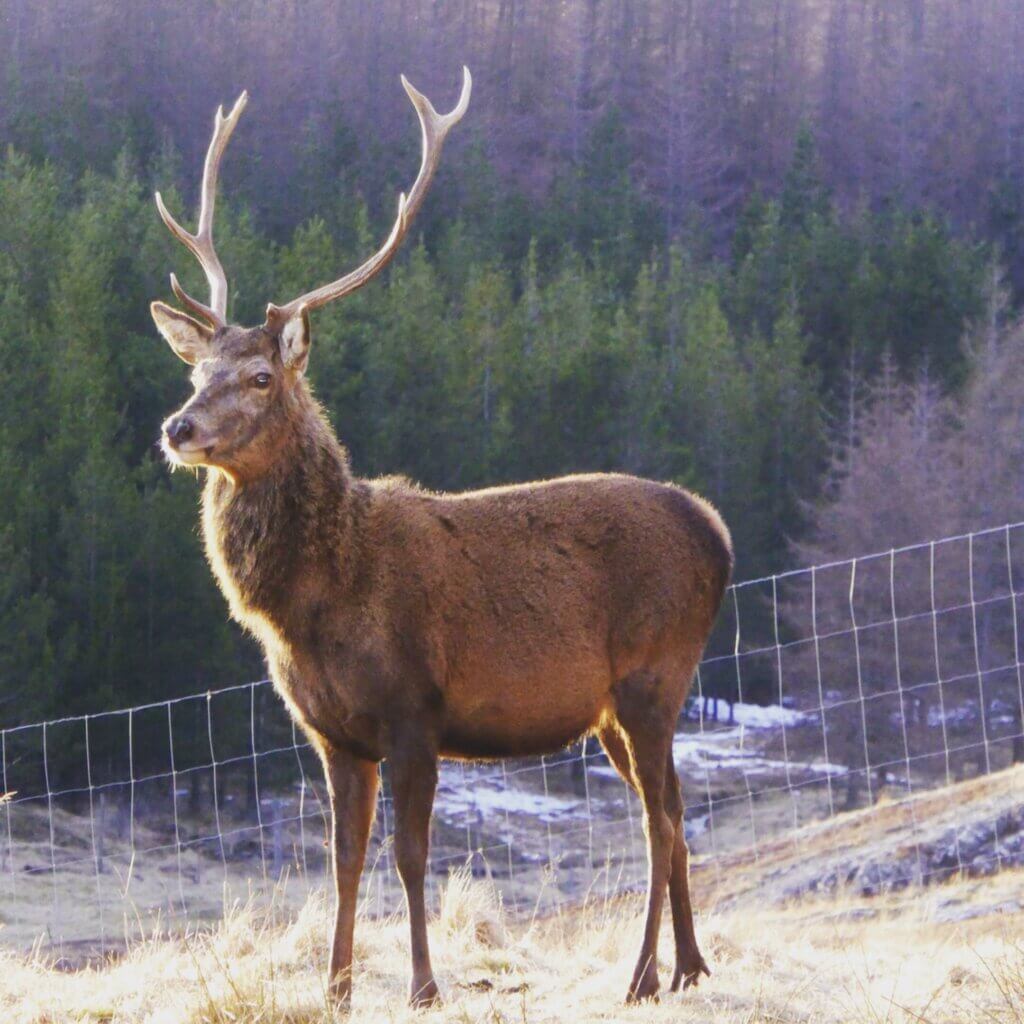
Scotland’s deer population has grown significantly due to the absence of natural predators and reduced hunting pressures. In parts of the Cairngorms, high densities of red and roe deer have a major impact on the landscape:
Young trees and native woodland struggle to regenerate due to constant browsing.
Ground flora is lost, reducing food and cover for other wildlife.
Peatlands—crucial carbon sinks—are damaged by trampling and erosion.
Rare species like the capercaillie lose the dense forest habitat they need.
To address this, organisations such as Cairngorms Connect—a partnership of land managers including RSPB Scotland, Wildland Ltd, NatureScot and Forestry and Land Scotland—are working to restore large-scale natural processes across 600 square kilometres of the Cairngorms. One key part of this vision? Reducing deer numbers to allow nature to recover.
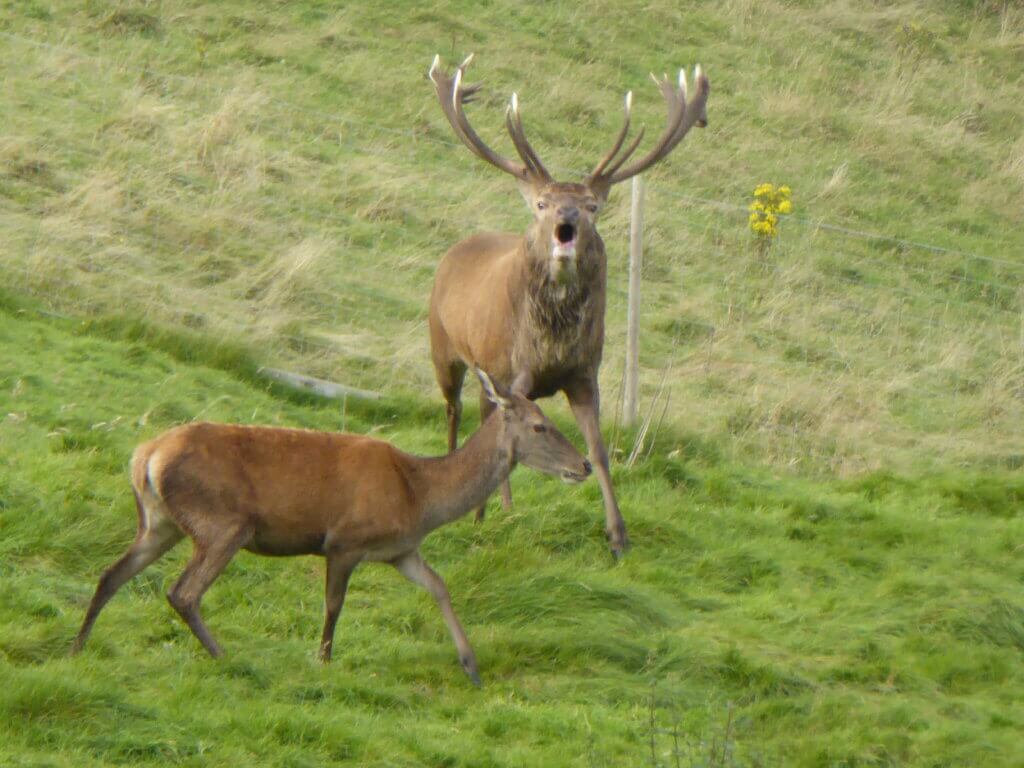
Culling deer is a sensitive but necessary part of ecological restoration. But it’s not about waste—far from it. In fact, venison is one of the most sustainable meats available: it’s wild, low in fat, rich in nutrients, and has a far smaller carbon footprint than intensively farmed alternatives.
Across the Cairngorms, deer taken during conservation-led culls are now processed through local venison larders, including those supported by Cairngorms Connect. These facilities ensure that wild meat is handled to high welfare and hygiene standards, creating a local food product that supports both conservation and community.
One exciting and inspiring aspect of the Cairngorms’ venison story is how it supports social good.
Through partnerships with community organisations and food poverty initiatives, venison from the National Park is increasingly being donated to local food banks. This not only reduces waste but also makes a healthy, high-quality protein available to those who need it most.
In a time when food prices are rising and ecological challenges mount, this joined-up approach—connecting land, people, and food—is a powerful example of how conservation doesn’t have to come at the cost of community.
While many conservationists support lower deer numbers, others—particularly on traditional sporting estates—highlight the cultural and economic value of deer stalking. It’s a source of rural employment and part of Highland heritage. Some worry that rewilding and reduced deer densities could marginalise long-standing traditions and local voices.
The solution isn’t simple. It lies in collaboration, compromise, and careful stewardship. Projects like Cairngorms Connect aim to demonstrate that ecological restoration can be achieved alongside sustainable rural economies and responsible food production.
When you visit the Cairngorms, you’re stepping into this evolving story. Here’s how you can make conscious choices during your stay:
Try local venison from a butcher, restaurant, or farmers’ market that sources meat from sustainable, conservation-driven culls.
Learn about rewilding and woodland regeneration—ask us about what’s happening near Fraoch Lodge.
Support inclusive conservation, where people and nature thrive together.
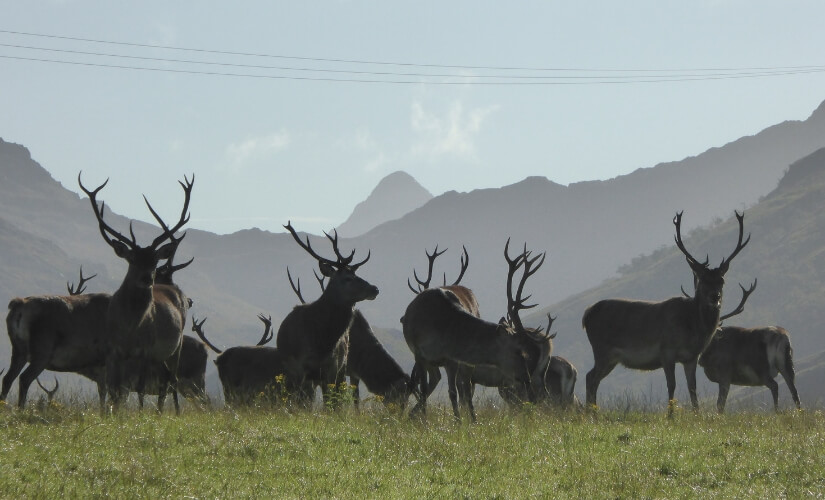
The red deer is not just a symbol of the Highlands—it’s a keystone species in a changing ecological and cultural landscape. Its future, and the future of the land it grazes, depends on thoughtful management and a willingness to look at the bigger picture.
At Scot Mountain Holidays, we walk through these landscapes every day. We see the impact of too many deer on struggling forests, and we also understand the pride and history that deer stalking represents for many Highland communities.
By connecting with projects like Cairngorms Connect and supporting the use of local venison, we believe it’s possible to restore balance—between people, place, and the wild things that live here.
Join us for a walk through the wild heart of the Highlands—and learn how nature, tradition, and sustainability all share the trail.
📧 Contact us to find out more
🔗 Explore our walking holidays
Unplugging in the heart of the Cairngorms National Park
We recently experienced a loss of broadband service here at Fraoch Lodge. It was panic stations all round.
We live in a world where our phones tell us the weather, the time, the route, what to eat, how to feel, and when to sleep. We wake up to the glow of notifications and go to bed after “just one more scroll.” But what happens when you switch it all off—even for a weekend?
Would you be able to enjoy a digital detox weekend?
At Fraoch Lodge, nestled in the tranquil village of Boat of Garten, we believe the answer is a resounding yes—and more than that, we believe your mind and body will thank you for it.
A digital detox doesn’t mean living in silence or boredom. It means swapping screens for real scenery. It’s giving your nervous system a break from pings and scrolls. It’s waking up not to headlines, but to birdsong and Highland air.
Studies show that taking regular breaks from screens can:
Improve sleep and reduce stress
Reconnect you with nature and your companions
Boost creativity and attention span
Reduce feelings of comparison, FOMO, and overwhelm
Our new Digital Detox Weekends are designed to ground you gently, not shock you into silence. You’ll still be busy—just in a completely different way.
Join guided walks through ancient Caledonian forest, heather moorland, and hidden lochans
Enjoy wholesome, home-cooked meals using local and seasonal ingredients – you can participate if you want and take home all the recipes used during your break
Journal or sketch your surroundings on your return to the Lodge – using only memory as your prompt
Relax fireside with a book or engage in unplugged conversation with fellow guests
Check email
Scroll through newsfeeds
Get stuck comparing travel selfies
Reply to pings, dings or group chats
We get it. The idea of switching off entirely can feel uncomfortable. But don’t worry—you’ll be supported. We have:
A safe space to store your devices if you choose to hand them in
Maps, clocks, books and nature guides for old-school navigation
Tips for transitioning gently into the weekend
And if you really need to check in with home, our WiFi still works—but we encourage you to pause first and ask: Is this moment really worth interrupting?

We’re lucky to be based in the Cairngorms National Park—a vast wilderness of forest, mountain, and wildlife. From the doorstep of Fraoch Lodge, you can follow quiet trails without seeing another soul, listen to woodpeckers drum in Abernethy Forest, or spot red squirrels.
Nature invites stillness. It rewards attention. And it waits patiently while you relearn how to just be.
Our Digital Detox Weekends run on select dates during the quieter seasons—spring and autumn are ideal, when the Cairngorms are alive with birdsong, wildflowers, or autumn colour.
These retreats are especially popular around:
World Mental Health Day (October 10th)
Digital Detox Day (September 5th)
National Day of Unplugging (March)
The first few hours are the hardest. But once you settle into the rhythm of real time—sunrise and sunset, footsteps and firelight—you might be surprised by how good it feels to disconnect in order to reconnect.
Come and experience it for yourself.
Would you be able to enjoy a digital detox weekend?
We think you’ll do more than enjoy it.
You’ll remember what it feels like to be here now.
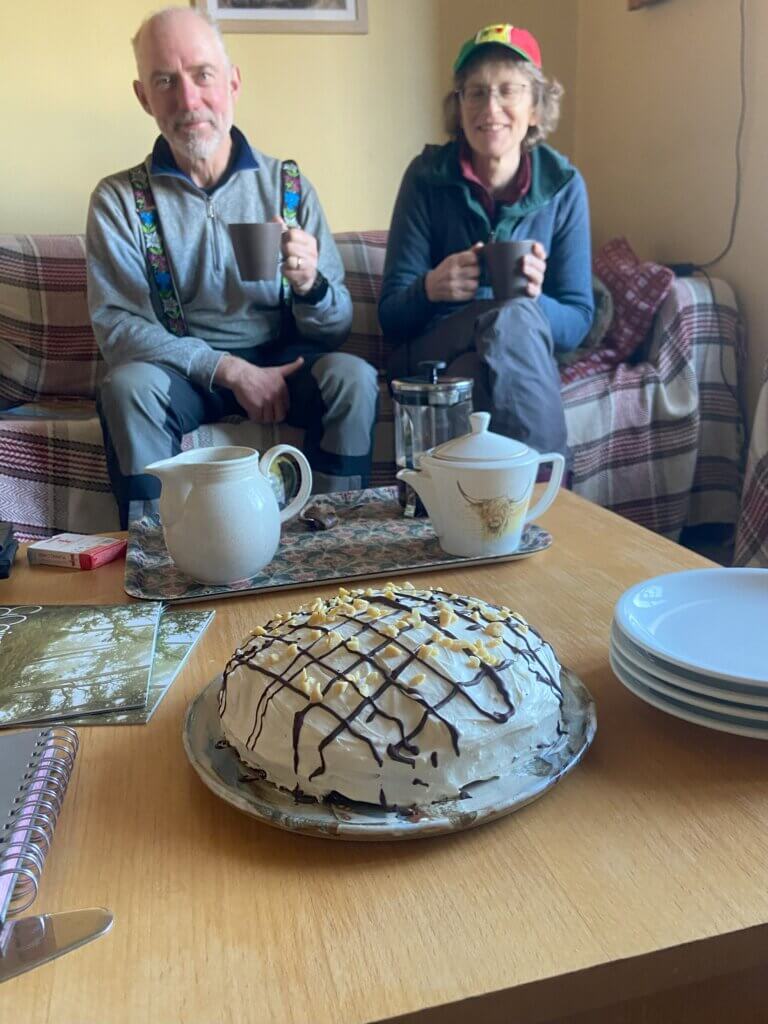
📩 Interested in booking a Digital Detox Weekend at Fraoch Lodge?
Contact us to find out when our next retreats are running—or to plan your own screen-free escape in the Cairngorms.
Looking for a rewarding and scenic mountain biking route in the Cairngorms National Park? The Burma Road is a local classic—and for good reason. Combining wide Highland views, a challenging ascent, and flowing countryside tracks, this 26-mile loop is a must-ride for adventurous cyclists. It’s suitable for both mountain bikes and gravel bikes and can be tackled straight from the doorstep of Fraoch Lodge, your base in Boat of Garten.
The Burma Road route is a fantastic way to see spectacular views of the Cairngorms and the picturesque countryside of the National Park. Graded hard and requiring a high fitness level to complete, this 26-mile cycling route is achievable in four to five hours.
Trekking over a mixture of tarmac, dirt, grass and rocky tracks makes sections of the trail challenging. And with a three mile extremely steep climb the initial part of the route can come across as particularly challenging. But, overall it is worth the initial exertion.
Distance: 26 miles / 41 km
Ascent: 2123 ft / 647 m
Time: 4–5 hours cycling time
Grade: Hard (fitness and bike handling required)
Bike type: Gravel or mountain bike
Best ridden: Late spring to autumn, when trails are dry and views are clearest
Approx. calorie count: 1800 kcal
The adventure begins right outside Fraoch Lodge, with a pleasant 6-mile warm-up ride to Aviemore, winding through moorland and pine forest. From there, follow the main road through Aviemore and across the A9 to begin the official Burma Road loop.
We can help with maps, gear checks, and even bike hire or guiding if you’d prefer extra support.
Once reaching Aviemore it’s as simple as following the main road through town, crossing the A9 and following a single tarmac road to the Scripture Union Centre at Alltnacriche. Having followed the route through a forest gate this is where things begin to get difficult.
Brace yourself—the first real test is a 3-mile steep climb beginning near the Scripture Union Centre at Alltnacriche. Even seasoned riders often hop off and push sections of this brutal gradient. But perseverance pays off: the higher you climb, the broader the views stretch, with the Cairngorm mountains unfolding behind you.
Don’t forget to pause, catch your breath, and soak in the scenery.
After reaching the high point, you’ll descend a rough, loose track with gravel and erosion channels that demand focus and steady control. Once you reach the bridge at the base, the trail levels and transitions into a more leisurely spin through Highland farmland and riverside paths.
Expect some boggy patches, grassy tracks, and a few gates, but this section is pure joy—especially with the hard climb behind you.
Once back on tarmac en route to Carrbridge, a 1-mile detour to Sluggan Bridge offers the chance to see an 18th-century arched bridge in an atmospheric setting. A photo opportunity not to be missed!
In Carrbridge, reward yourself with a well-earned pint and a snap of the iconic packhorse bridge, before heading the final 5 miles back to Fraoch Lodge via the signed National Cycle Route 7.
Fitness required: High
Bike type: Mountain or gravel with good tyres and gears
Water & snacks: Bring your own; no services on route
Weather: Check the forecast—conditions can change quickly
Navigation: You can download the route on Komoot but we highly recommend carrying an OS paper map as a back up in case of any phone failures. Always best to download your map on your phone, especially in more remote areas with intermittent or non-existent phone signal.
Phone signal: Intermittent, especially on the high section
Bike facilities at Fraoch Lodge: Secure storage, repair tools, drying room, packed lunches, and a hearty dinner to come home to!
No need for a car—ride out straight from your accommodation
Stay in a cycling-friendly lodge with route support and local knowledge
Relax post-ride with home baking, hot showers, and mountain views
Extend your stay with more Cairngorm rides like Glenmore Forest, Ryvoan Pass, or Speyside Way
All content © Copyright Scot Mountain Holidays 2025
Responsive web design by Summit Web Solutions